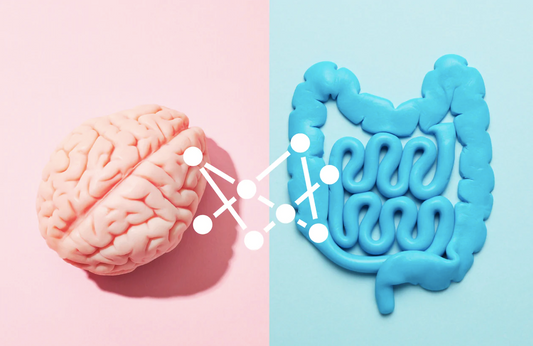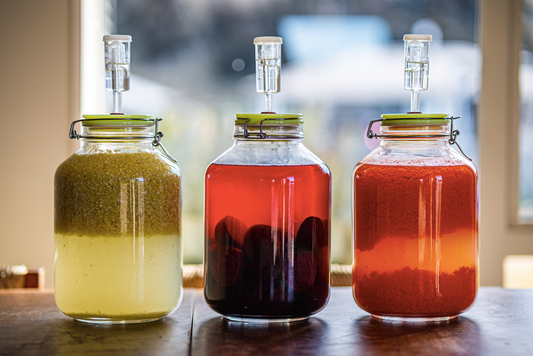We used to believe that the gut and brain, were completely separate from each other. However, recent research has shown that the body is much more interdependent than we ever thought, and our gut health may impact our brain - as well as our overall mental health and mood!
Let’s take a deep dive into looking at the connection between the gut & brain, the functions that can impact our mood and mental health and the ways in which we can optimise our gut health to fuel our brain and make sure we are feeling as great as we deserve.
But first - the science behind our gut-brain connection
As we learn more about the body, the full picture of just how intricately connected all the systems of the body becomes apparent.
Our central nervous system connects our brain to the rest of the body but did you know that your gut also has a nervous system of its own? This is called the enteric nervous system (ENS for short) and it’s responsible for what we know as ‘gut feelings’ - butterflies, nerves and our strong gut intuition and instinct - amongst a whole host of other functions.
The ENS and associated feelings and functions are so powerful that scientists refer to it as our “second brain”. This system also contains the vagus nerve - one of the most significant nerves connecting your gut and brain. Think of it as quite literally a direct line of comms between your gut microbiome and your brain.
What on earth does our ENS do?... And why this matters.

The main function of the ENS is regulating and controlling digestion – from swallowing to breaking down food with the right enzymes, to managing the blood flow that helps with nutrient absorption and elimination.
You may have heard- or experienced first-hand- that anxiety can trigger stomach issues.
Now there’s evidence that it can be the other way around too: irritation in the gastrointestinal system may alert the central nervous system that something is off – triggering mood changes.
70 percent of our immune system lives in the gut.
It produces many of the same neurotransmitters (more on these soon) as the brain does, like serotonin, dopamine and gamma-aminobutyric acid – ALL of which play a big role in regulating mood.
Recent research has shown that over 90 percent of serotonin is created in the digestive tract. which is HUGE considering serotonin's role in regulating our mood and mental health - and making us feel good .
… back to the neurotransmitters in our gut:
Neurotransmitters are chemical signals that transmit information from a neuron to another cell and instruct the cells of our body and keep them operating efficiently.
Although we associate the term “neuro” with “brain,” most of the neurotransmitters in our bodies actually live in the gut. Increased or decreased levels of serotonin, dopamine and a whole host of others have been linked to a range of gastrointestinal illnesses - from irritable bowel syndrome.
*Stress has entered the gut-brain connection chat
Stress—whether psychological, emotional or physical—plays a massive role in both brain and gut health. In a recent study, the Institute for Functional Medicine found that 75 to 90 per cent of all chronic disease is related to stress and inflammation- not genetic factors as we previously thought.
Stress is the beginning of a downward spiral into disease that can be very hard to reverse. External chronic stressors such as finances, family and environmental factors can ramp up our stress hormones- like cortisol and adrenaline.

Producing these hormones takes up an incredible amount of energy from our bodies, leaving us physically and mentally exhausted.
A self perpetuating cycle often starts as our stress levels impact our sleep and ability to make good food choices, which then results in more stress- which means our gut is in trouble.
High stress, low energy, and low-quality nutrition mean our body starts to prioritize key systems: digestion slows down, hormones start spiralling and our immune response weakens.
Mental health symptoms start to manifest as being easily distracted, frazzled, quick to anger, or low mood - we all know what happens to our minds when we are stressed!
The microbiome and mood
Our gut plays host to a massive community of bacteria, fungi, and other organisms that help us digest our food and absorb nutrients–-they even create some of the nutrients we need themselves. This community of microscopic organisms is called the microbiome. For more about the microbiome check out our blog post here.
Over the last several years, we’ve learned more and more about the connection between the health of the microbiome and our health overall, including our mental health. Long story short, it seems that the healthier our gut microbiome is the better we feel physically and mentally. This usually means:
- There are more “good guys” than “bad guys,” in terms of bacteria. Aka- more supportive organisms that create and process nutrients than ones that steal our nutrients or overproliferate, like candida.
- Food is easily digested and bowel movements are regular moving toxins and metabolic waste out of the body.
Inflammation has a lot to answer for!
When we have issues with our gut, the door for inflammation is opened throughout the rest of the body. And full-body inflammation can really put a damper on your mood as well as a hell of a lot of our physical processes.
Leaky gut can also allow toxins to get into the bloodstream, which then reaches the blood-brain barrier. This leads to toxic accumulation in the brain tissue - where these toxins can be stored with ease. This can result in making us feel anxious and/or depressed and cause the likes of brain fog and mental fatigue.
Nourish thy gut- improve thy mood
If you are ready to start investing in your gut health and see the impacts on your mind, here are some ways to kickstart your journey
Food that supports your mood is food that; nourishes your gut, lowers inflammation - and is jam-packed with nutrients!
There are plenty of ways to eat that satisfy these requirements and cater to individual tastes, preferences and dietary requirements/ restrictions. In general, you should go for the highest quality and the widest variety you can afford, especially when it comes to plant foods.

Here are a few staples you should try to include:
- Grass-fed meat, including liver and organ meats: These meats have the highest amount of bioavailable nutrition over any other food, including vitamin C, B12, A, zinc, copper, and more. If you are vegan/ vegetarian try and double up on our plant-based options below.
- Free range eggs: high in choline, a precursor to acetylcholine, the most abundant neurotransmitter in the body
- Yogurt/Kefir: Yogurt and its more drinkable counterpart kefir can be great probiotics that support your microbiome. Of course, some people do better with dairy than others - so keep this in mind.
- Fermented tonics like kvass tonics (we had to)
- Beans: Beans get a bad rap for digestion, but when well cooked and added slowly to your diet, they help bind toxins in your bile and carry them out of the body. Try adding a few spoonfuls a day and increasing over time, and always eat your healthy fats separately.
- Olive oil: Olive oil is an anti-inflammatory fat that has brain-boosting properties. Best enjoyed drizzled on at the last minute to finish soups, salads, or really anything you like.
- Berries: Strawberries, blueberries, blackberries, and raspberries are well-known as a healthy part of an anti-inflammatory diet. They are also packed with polyphenols and vitamin C.
-
Chocolate/Cacao: Before you run to the supermarket - remember M O D E R A T I ON.
Dark chocolate, particularly cacao, contains tons of magnesium, zinc, and more nutrients that can relax us and relieve anxiety.
Get (gut-friendly) moving
Great news for those of us who hate intense cardio - you’ve got a reason to stay away. High-intensity exercise can actually increase your stress hormones and create even more inflammation in the gut.

Lower-intensity forms of exercise like yoga, pilates, strength training - and even simple walking- are much easier for the body to tolerate. They’re also more likely to add energy to the body instead of draining it away.
If you enjoy cardio, you can still practice 1-2 times per week, but make sure to give your body plenty of rest too!
The bottom line:
Nourishing and rebuilding your microbiome and your gut lining can go a long way toward improving your mental health and how you feel on a day-to-day basis. Although it may feel overwhelming when there are so many sources of information about gut health - even small steps, like adding more gut nourishing foods into your diet - can make a positive impact.
We also recommend working with a trusted practitioner who can guide you, especially if you’re trying to make big changes in your diet and lifestyle! You deserve to have your gut and brain working at the absolute best!




